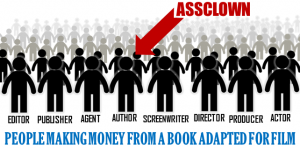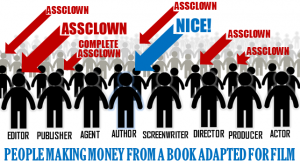 In protest of the homophobic views of author Orson Scott Card, many are talking about boycotting the upcoming film adaptation of his best-selling novel Ender’s Game.
In protest of the homophobic views of author Orson Scott Card, many are talking about boycotting the upcoming film adaptation of his best-selling novel Ender’s Game.
Before anyone pats themselves on the back for keeping a few dimes of profit out of the pocket of a bigoted assclown, let’s take a look at the reality of outrage-based boycotting.
But first, let’s discuss the book itself. If you haven’t read it, you should, if only for the giggle factor in comparing its content with the fact that the author protests homosexuality so ferociously.
The homoeroticism of this nearly 30-year-old sci-fi novel is so unmistakeable that, in this more queer-aware era, it reads almost like an allegorical satire about conversion therapy. “Come to our camp and kill the bugger … in your mind.” I won’t even go into the details, but if you want an interesting breakdown, check out how Jessy Randall at the Hey There’s A Dead Guy blog parses the male-on-male dynamics of the book.
Reading the book while aware of Card’s rather extreme stance on homosexuality is a real *smh* experience. That anti-gay dogma really doesn’t wash all the gay away, now does it?
Of course, the Ender’s Game movie might be scrubbed of these (subconscious?) winks and nods, but if the film draws attention to the book, is that really so bad considering that it makes Card’s politics look closeted and silly?
_
WHY BOYCOTTING ENDER’S GAME IS HYPOCRITICAL
But, let’s get to the meat of it. One of the more popular arguments people are making is that they don’t want to see the movie because their money might end up funding the political activity of a homophobic assclown.
I’m paraphrasing, of course.
However, Card’s not the only person standing to profit from the Ender’s Game film. There are literally thousands of people who cha-ching! every time someone sees a book-adapted film:

Now, I am not saying that you should see Ender’s Game because these thousands of others could be perfectly nice people with politically correct, 21st century views on the LGBT community, and thus they deserve to make a decent living. I’m saying they could also be bigoted, homophobic assclowns just like Card.
I know that seems to undermine my point. Stick with me, here.
Imagine a film adapted from a novel written by a super-nice, nice-tastic nice guy. The nicest author you can dream up. A dude or dudette who sneezes cotton candy, volunteers as a drowning puppy revival specialist, and donates a full 80 percent of income to charities that provide organic, fair-trade foodstuffs to starving, orphaned burn victims in war-torn, underdeveloped countries.
You’d never boycott that film, would you?
But, chances are, when you go see that film version of the nice author’s book, you’re still putting money in the pockets of a lot of bigoted assclowns who will, in turn, put some of that money in the coffers of bigoted political action groups and think-tanks.
It’s rather arbitrary to pick on a film whose author is a bigot rather than a film whose profiting bigotry is found in the author’s agent or publisher, the screenwriter, director, producer, composer, actors, a smattering of grips and costume designers, dozens of set builders and caterers, blah blah, yada-yada … I think you get the idea.

Is a boycott against Ender’s Game really fighting homophobic bias or feeding another type of bias? One could make the argument that Card is more “high profile” than an anonymous collection of hundreds of background bigots. But, Card’s infamy actually undermines the homophobic politics, because it raises awareness and provides a teaching moment. And, those anonymous dollars spend just as well as Card’s famous ones do.
Boycotters (who aren’t boycotting every film and book) are essentially saying they’ll gladly fund homophobia so long as they don’t have to see its face and can pretend (weakly) that they’re fighting the good fight. The effort is utterly naïve and hypocritical.
This doesn’t hurt bigotry, it just hurts a film where the bigotry is in a specific person. So, it’s really feeding bias among artworks, not fighting bias among sexualities.
Plus, it dumbs down the discourse with poorly thought-out stunt politics.
And, if you want to avoid hypocrisy by ferreting out the bigotry anywhere it might hide among the profiteers of the silver screen and printed page, good luck with that. I suspect that if we could push a magic button and eliminate all books and films that put money in the pockets of a bigoted assclown like Card, cinemas and bookshelves would be as empty as the political gestures activists and pundits use to keep themselves in the oppression exploitation racket.
You really want to strike a blow against Card’s homophobia? Celebrate the homoerotic subtext of the most famous book he wrote. Loudly. And spread the word about how it provides more proof (as if more were needed!) that homophobia is often ultimately a self-suppressive tactic.

J. Nelson Leith
July 19, 2013 at 1:27 pm
For the record, I have no beef with people who refuse to see the film (or any film) because they disagree with the content. That’s actually a rational way to live.
Also, although I’m not “boycotting” the film because of Card, I’m not really that interested in seeing it either. I liked the book, when I was a kid, but now the story seems painfully simplistic, gimmicky, and too easily reduced to its own synopsis.